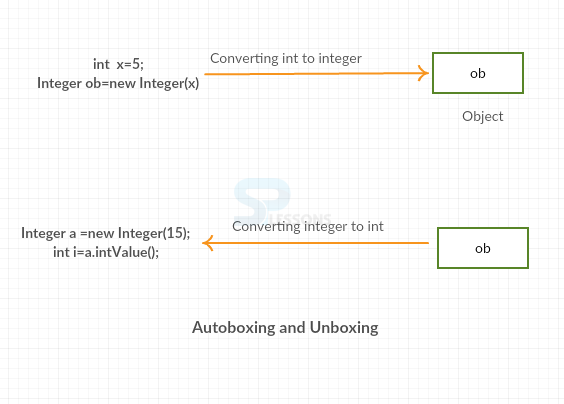 Description
Description
Wrapper Class in Java, The wrapper class is a process of converting the primitive into object and object into the primitive. Before wrapper class, autoboxing and unboxing feature used to convert primitive into object and object into primitive, the automatic conversion of primitive into an object is called as autoboxing. All wrapper classes are final. All wrapper classes are available in java.lang package.
- If compiler performing boxing operation on its own is known as Autoboxing. Ex: Integer empId=107;
- Wrapper Class in Java, Converting wrapper type object back to primitive type is known as Unboxing operation.
- If a reference variable is created for an Object type,that reference variable can store any type of Object because all objects should inherit from Object class. Hence, it is automatically upcasted.
- In a reference variable which is of type Object stores primitive types.
 Wrapper
Class
Wrapper
Class
Wrapper Class in Java, Following are the 8 wrapper classes.
| Primitive Type | Wrapper class |
|---|---|
| boolean | Boolean |
| char | Character |
| byte | Byte |
| short | Short |
| int | Integer |
| long | Long |
| float | Float |
| double | Double |
 Example
Example
Wrapper Class in Java, Following is an example to convert from Primitive to Wrapper.
[java]
package splesson;
public class PrimitiveToWrapper {
public static void main(String args[]){
//Converting int into Integer
int a=200;
Integer i=Integer.valueOf(a);//converting int into Integer
Integer j=a;//autoboxing, now compiler will write Integer.valueOf(a) internally
System.out.println(a+" "+i+" "+j);
}
}
[/java]
Converting int into Integer as follows.
[java]int a=200;
Integer i=Integer.valueOf(a);[/java]
Output:
When compile the code following is the result will be displayed.
[c]200 200 200
[/c]
 Example
Example
Wrapper Class in Java, Following is an example to convert from Wrapper to Primitive.
WrappertoPrimitive.java
[java]
package splesson;
public class WrappertoPrimitive {
public static void main(String args[]){
//Converting Integer to int
Integer a=new Integer(6);
int i=a.intValue();//converting Integer to int
int j=a;//unboxing, now compiler will write a.intValue() internally
System.out.println(a+" "+i+" "+j);
}
}
[/java]
The following is an image that shows how to do auto boxing and unboxing.
Output:
When compile the code following is the result will be displayed.
[c]6 6 6
[/c]
 Description
Description
If programmer call a method passing by a value, then it is called as call by value. The following is an example where the original will not change.
[java]package com;
public class MyOperation {
int data=100;
void change(int data){
data=data+100;//changes will be in the local variable only
}
public static void main(String args[]){
MyOperation op=new MyOperation();
System.out.println("before change "+op.data);
op.change(500);
System.out.println("after change "+op.data);
}
}
[/java]
In the above example, the changes (data=data+100) are stored in local variable only. Now the result will be as follows.
[java]
before change 100
after change 100
[/java]
The following is the same example where the original value will be changed.
[java]package com;
public class MyOperation {
int data=100;
void change(MyOperation op){
op.data=op.data+100;//changes will be in the instance variable
}
public static void main(String args[]){
MyOperation op=new MyOperation();
System.out.println("before change "+op.data);
op.change(op);//passing object
System.out.println("after change "+op.data);
}
}
[/java]
In the above example, programmer made the changes in called method, programmer passed object in area of primitive value. The result will be as follows.
[java]
before change 100
after change 200
[/java]
For more detailed overview on methods click here
 Key Points
Key Points
- Converting wrapper type object back to primitive type is known as Unboxing operation.
- All wrapper classes are final.





